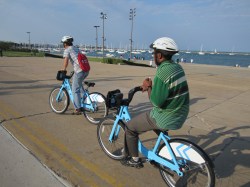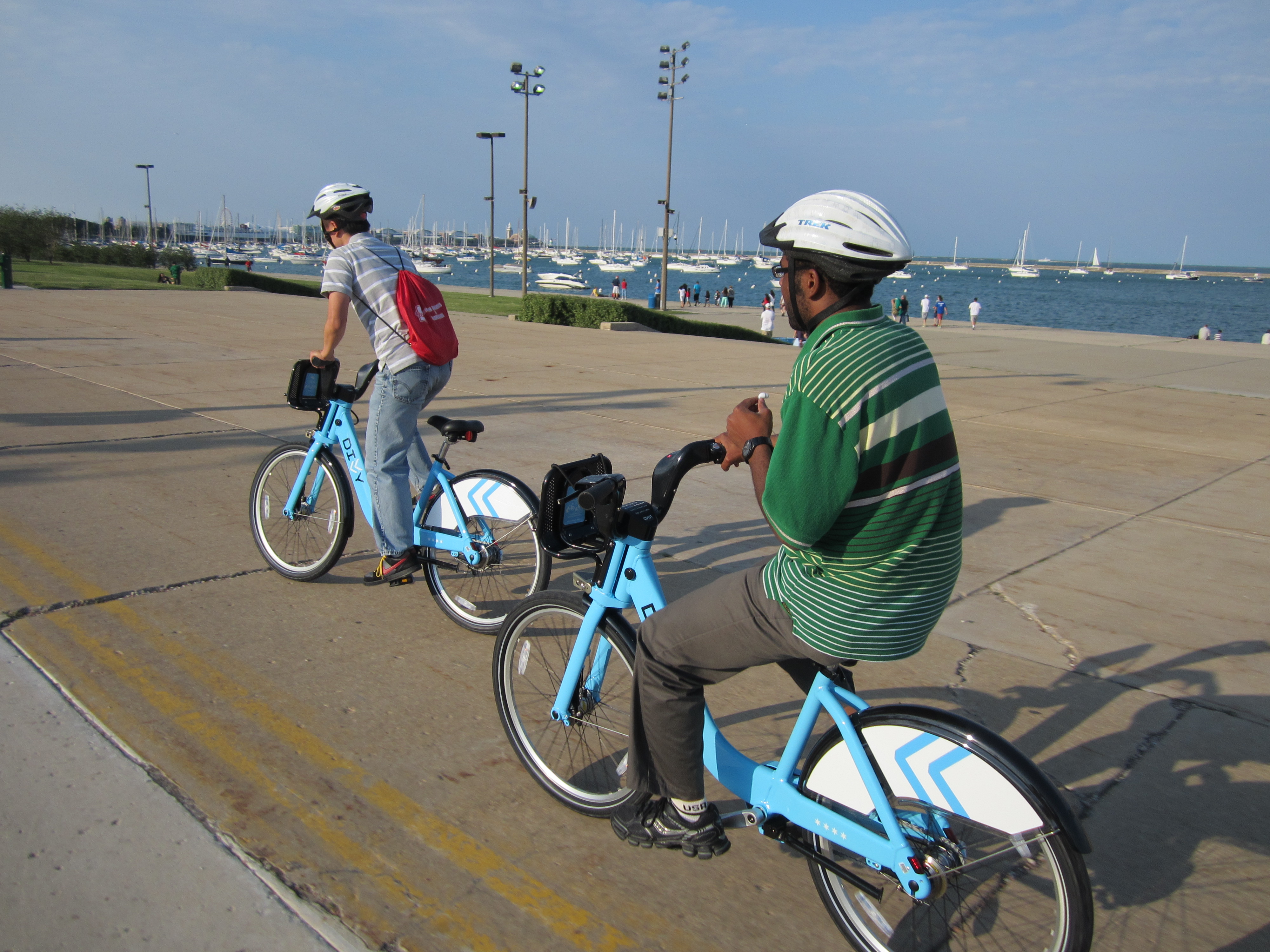
John GreenfieldPedaling Divvy bikes on the lakefront.
To hear the Chicago Tribune tell it, people who used the city’s new Divvy bike-share system on its first day of operations last Friday experienced nothing but headaches. But on Sunday, I rode a Divvy to all 68 of the new docking stations, and witnessed only a few problems, most of them minor. I also spoke to plenty of satisfied customers, and walked away from my 12-hour, 40-mile odyssey mostly unscathed.
The system, funded with $22 million in federal and local grants, is owned by the city of Chicago and operated by Alta Bike Share, Inc., which also runs New York’s recently launched Citi Bike program, as well as systems in Washington, D.C., and Boston. Denver also has the B-cycle public bicycle program, and other major cities slated to get bikeshares in the near future include San Francisco, Seattle, Philadelphia, and Phoenix.
Divvy is part of several large-scale sustainable transportation initiatives in the works under Mayor Rahm Emanuel. These include a complete overhaul of the south branch of Chicago Transit Authority’s Red Line, bus rapid transit projects, construction of 100 miles of protected and buffered bike lanes, and The Bloomingdale elevated greenway, which promises to put New York City’s High Line to shame.
Chicago’s bike-share program will eventually include 400 docking stations and 4,000 bikes, clunky-but-comfy three-speeds painted the powder-blue shade of the Chicago flag’s stripes. A $7 daily pass or $75 annual membership entitles users to an unlimited number of half-hour trips. To encourage turnaround, a $2 late fee applies for the next 30 minutes, with charges rising steeply for subsequent half hours. But it’s an open secret that you can keep a bike as long as you like without late fees, as long as you check it into a station every half hour.
During my “Tour de Divvy” on Sunday, the vast majority of bike-share users I encountered seemed generally pleased with the service. Wes Rizal, a member who was docking his bike in the River West neighborhood, just northwest of the Loop central business district, said he’d ridden downtown that morning in a friend’s car and used bikeshare to get home. “I could have walked or taken the train, but I’m taking advantage of the fact that I can access a bike that isn’t my own.”
In the South Loop, I met Priya Suriya, who was docking her Divvy (her companion, Paul Meinshausen, was on his own fixie) across the street from a supermarket, having already done some shopping by bike at a department store. Since Suriya and Meinshausen just moved here from Boston, they were already comfortable using the Alta-run Hubway system. They’d been enjoying running errands on this gorgeous afternoon, but reported that stations at the most popular destinations, like Millennium Park, tend to fill to capacity. “It seems like they haven’t quite gotten the hang of rebalancing yet,” Suriya said.
When I got to the sole lakefront station, just east of the Loop on Monroe Street, I saw this issue for myself. It was obvious that the small station here didn’t have enough slots to accommodate all the people who wanted to dock their Divvys and stroll along the shore. Also, one of the docks was broken — a metal pin in the locking apparatus was not engaging, making it impossible to secure a bike.
North of downtown at the Oak Street Beach station, I talked with Vincent Smith and his two friends, who’d been “dock surfing” all afternoon, just as I had. They’d been at the Pride Parade in Boystown and had slowly been working their way south by Divvy. “Once you get used to the system, it’s really easy to get around,” Smith said.
I myself was having fun cruising from station to station. It was well after dark as I knocked out stops north of the Loop in the Old Town and Lincoln Park neighborhoods. My legs were aching from many miles of powering the Clydesdale of a bike, and I started developing a blister on the thumb of my gearshift hand.
At a docking station near the Brown Line’s Diversey Street stop, I encountered the most serious problem of the day. None of the docks allowed me to securely park my ride — the solar-powered station seemed to be out of juice, a problem that was common during the first few weeks of Citi Bike service, which the NYC program seems to have mostly solved. I called Divvy’s customer service line and the rep promised to send someone to fix the problem immediately.
After I checked in at the last two stations, around midnight, I made my way to the westernmost station in the trendy Wicker Park neighborhood to dock my ride once more and catch the Blue Line home to Logan Square, which doesn’t have Divvy yet. As I pedaled, I crunched the numbers: Out of the 68 stations in the system, there were only two where I’d been unable to park, a respectable number for a system that had only been running for three days.
The kinks in the system were apparently not enough to deter many other Chicagoans, either: The city transportation department reported that 4,123 Divvy trips were taken from Friday morning to Sunday night, and as of Monday morning, more than 1,700 Chicago residents had bought memberships.
After interviewing a few disgruntled customers on the launch day, the Trib’s Jon Hilkevitch had written, “Chicago’s federally funded Divvy bicycle-sharing program rolled out on Friday, and the shared experience some customers came away with was frustration.” But my grand, if grueling, saga from station to station wasn’t frustrating. I had a blast.




